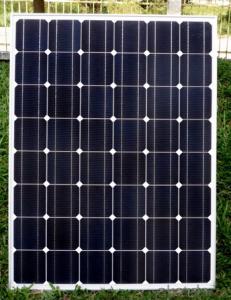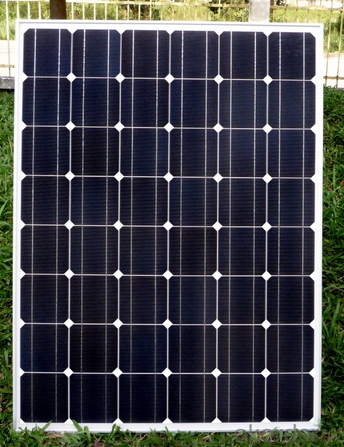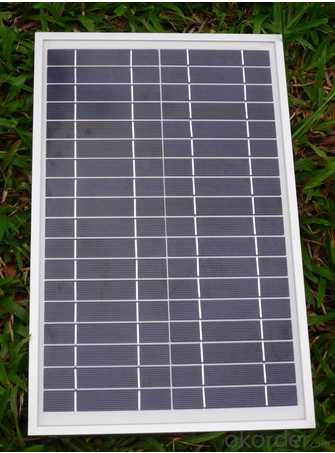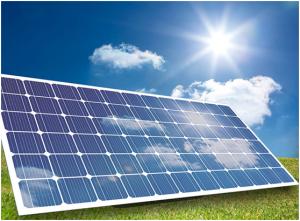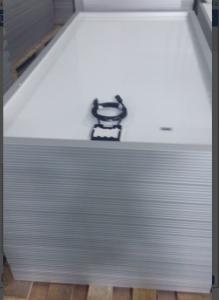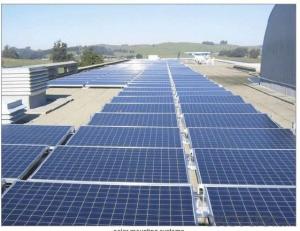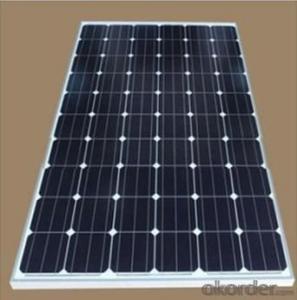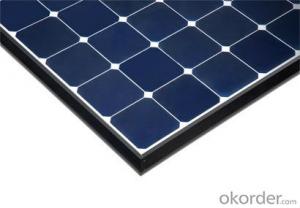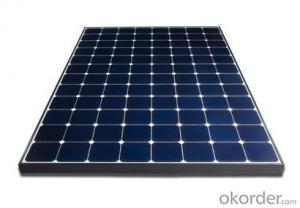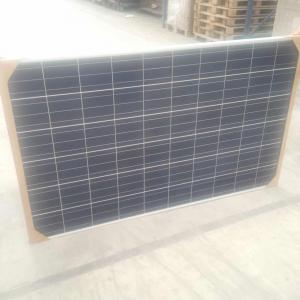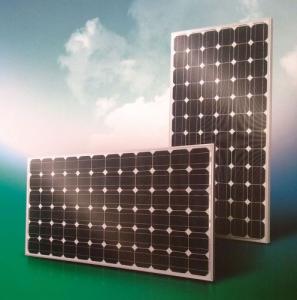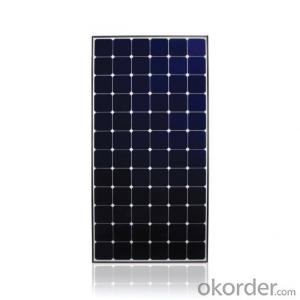25W CNBM Monocrystalline Silicon Pool Heating Solar Panels for Home Use
- Loading Port:
- Tianjin
- Payment Terms:
- TT OR LC
- Min Order Qty:
- 100 watt
- Supply Capability:
- 1000 watt/month
OKorder Service Pledge
OKorder Financial Service
You Might Also Like
Specification
25W CNBM Monocrystalline Silicon Panel for Home Using
Production description
while the rest of the overall market is made up of thin-film technologies using cadmium telluride, CIGS and amorphous silicon[7]Emerging, third generation solar technologies use advanced thin-film cells. They produce a relatively high-efficiency conversion for the low cost compared to other solar technologies. Also, high-cost, high-efficiency, and close-packed rectangular multi-junction (MJ) cells are preferably used in solar panels on spacecraft, as they offer the highest ratio of generated power per kilogram lifted into space. MJ-cells are compound semiconductors and made of gallium arsenide (GaAs) and other semiconductor materials. Another emerging PV technology using MJ-cells is concentrator photovoltaics (CPV).
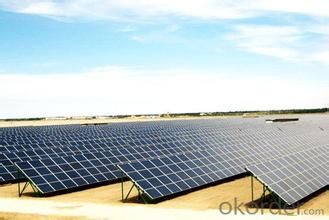
Feature
1.High conversion efficiencies resulting in superior power output performance.
2.Outstanding power output even in low light or high temperature conditions
3.Optimized design for ease of soldering and lamination
Physical characteristic
1. Rigorous quality control meets the highest international standards.
2. High-transmissivity low-iron tempered glass, strong aluminium frame.
3. Using UV-resistant silicon.
4. IS09001/14001/CE/TUV/UL
- Q: My hubby and I are waiting to move in to our camper but have to figure out how many solar panels, batteries, etc. to get. I can't find the info per appliance for Watts and amps, but does anyone have a good, general idea of how many Watts it'd take to run the whole shabang? It's a 999, 25-foot Sportsmen tag-a-long, if that helps..It's got the following, and we'd like to run the propane things off of electric:*Refrigerator/freezer*Microwave*Oven/stove*AC/Heat*Will have a tv, phone chargers, laptop charger, but those will be unplugged when not in useThanks so much! It's such a headache.. You get SO MUCH different info from different places.. OI..
- Running an oven or stove on solar is not a practicality; too much power is needed, use gas. Ditto, heating using solar electricity is not a practicality, and AC would also be asking a lot. The other things, within limits, might be do-able. You'll be needing as many solar panels as you can fit on. If I was you I'd consult a solar installer about how big your battery bank should be once you have decided how many Watts of panels you can put on.
- Q: I want to buy a solar panel kit but I'm unsure of how it works. Basically I want to run my entainment set, Xbox, cable box, 46 led tv, and some desktop speakers. I went online and found a kit for like 250 or something like that at homedepot and was wondering if that kit is worth the money or go bigger or something.
- Solar panels use light energy (photons) from the sun to generate electricity through the photovoltaic effect. The structural (load carrying) member of a module can either be the top layer or the back layer. The majority of modules use wafer-based crystalline silicon cells or thin-film cells based on cadmium telluride or silicon. The conducting wires that take the current off the panels may contain silver, copper or other non-magnetic conductive transition metals.
- Q: How many kilowatts? Would it be enough to power my electric heat?Does one panel cost about $2000.?
- The first thing to understand is that there is nothing complex about a solar panel. It is nothing more than a collection of solar or PV cells on a board that is fitted to the most appropriate part of your home, generally on the roof. There are guides out there that teach you how to build a solar panel and a windmill for just $50, and it’s very easy to make. Best of all, you can save 70% or more on your energy bill, adding up to thousands of dollars each year in savings. I reviewed both free guides and paid guides and have come up with our top to Build your own solar panels.
- Q: if u buy solar panels and never take em out of the box for like thirty years will they still work good thirty years after you bought them
- Batteries can only be recharged so many times and as for panels going bad, only the weather will help break the metal down by rusting it away.
- Q: Can solar panels be used for powering public transportation?
- Yes, solar panels can be used for powering public transportation. Solar energy can be harnessed through solar panels and converted into electricity, which can then be used to power electric buses, trains, trams, and other forms of public transportation. This helps reduce dependence on fossil fuels, lower greenhouse gas emissions, and promote sustainable and clean energy solutions for transportation systems.
- Q: I would like to know how do you build a solar panel?
- At first, you will need about one square foot of thin copper plate, two alligator clips and short leads of wire, a wide mouth glass jar, tap water and salt. Cheers,
- Q: Can solar panels be used in areas with high temperatures?
- Yes, solar panels can be used in areas with high temperatures. In fact, solar panels are designed to withstand a wide range of environmental conditions, including high temperatures. However, it's important to note that extreme heat can slightly reduce the efficiency of solar panels, but this reduction is usually minimal and does not significantly impact their overall performance. Additionally, proper installation and maintenance can help mitigate any potential heat-related issues.
- Q: Can solar panels be used for street lighting?
- Yes, solar panels can be used for street lighting. By harnessing the energy from the sun, solar panels can power street lights, eliminating the need for electricity from the grid and reducing carbon emissions. Solar-powered street lighting systems are increasingly being adopted as a sustainable and cost-effective solution for illuminating streets and public spaces.
- Q: Can anyone tell me how to connect a solar panel from a calculator to a motor from an RC car.
- Connecting them is not a problem: the solar cell has two leads or terminals, and so does the motor. The problem is that the panel from the calculator cannot supply very much current, and you need quite a bit for the motor. Also, the voltage is probably not more than 3 volts, and the motor needs probably six to twelve volts. If you have a voltmeter, check the output from the solar cell. You can get solar cells that will put out more current, but they will be bigger than the ones used for calculators. Even with these, you will probably need several in series to get enough voltage for the motor.
- Q: i really love the idea of solar and want to start out small, so i'm new to this.I plan on getting an 85w panel to charge my laptop. what other equipment is needed to accomplish this?would i need to get a battery or does the solar panel hook directly to the laptop. Does one end just lead to a conventional outlet similar to a wall outlet?could someone please give me a detailed explanation with options about this? i would greatly appreciate it.
- humm..... .need HUGE solar panel (alot) 2. wires 3. aligato clips . put the panels on the roof 2. use the aligator clip to clip the wire from the panel to the bars of the pluger of the comp. charger 3.tada mark me best:)
Send your message to us
25W CNBM Monocrystalline Silicon Pool Heating Solar Panels for Home Use
- Loading Port:
- Tianjin
- Payment Terms:
- TT OR LC
- Min Order Qty:
- 100 watt
- Supply Capability:
- 1000 watt/month
OKorder Service Pledge
OKorder Financial Service
Similar products
Hot products
Hot Searches
Related keywords
